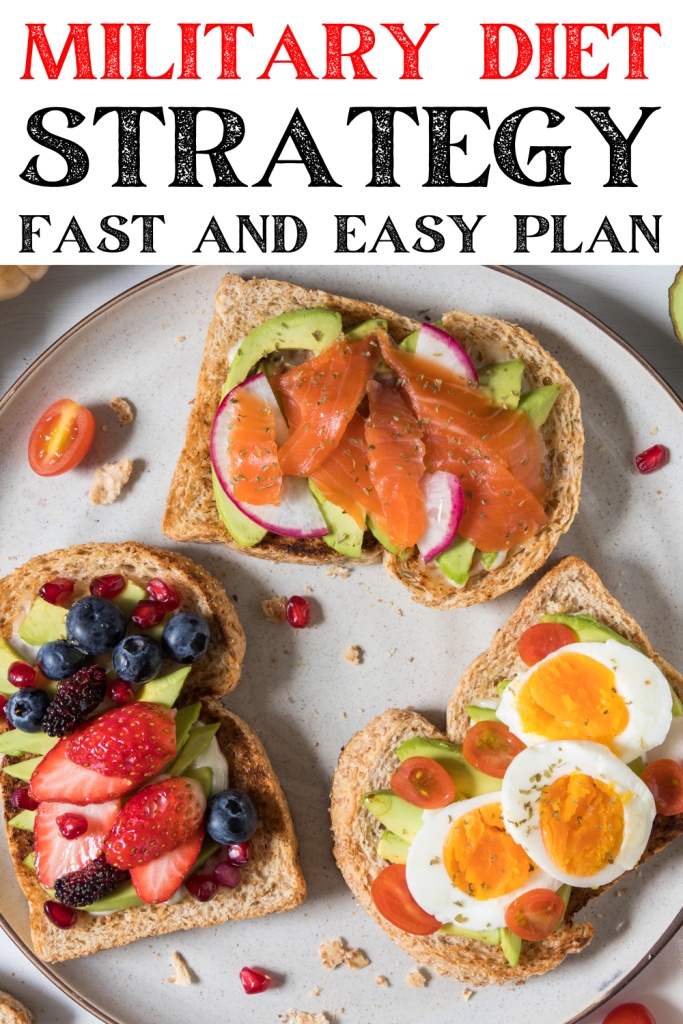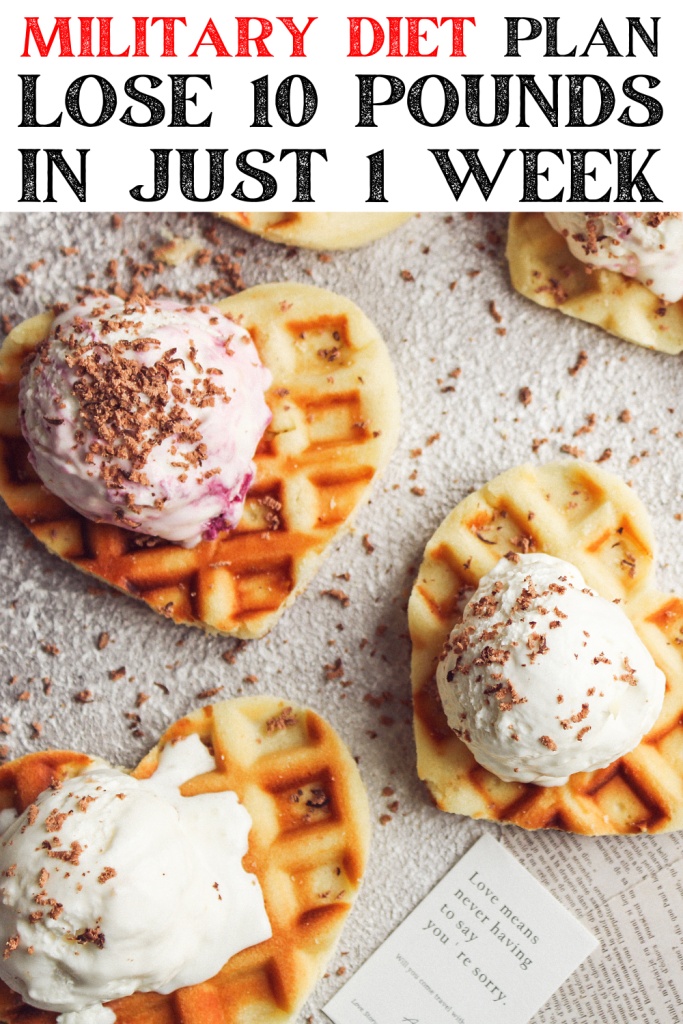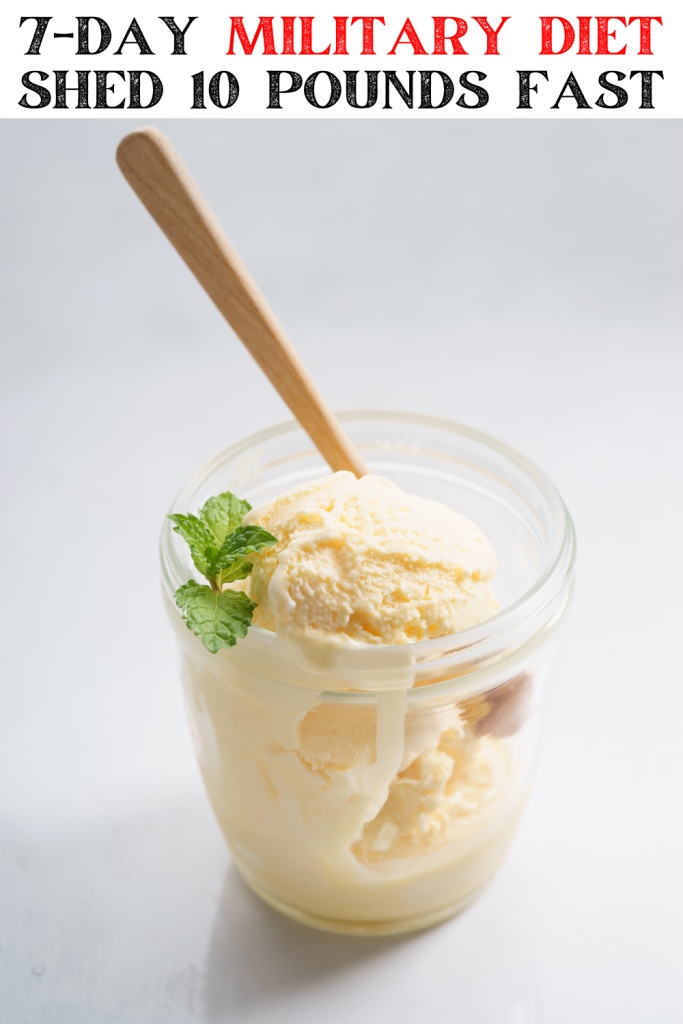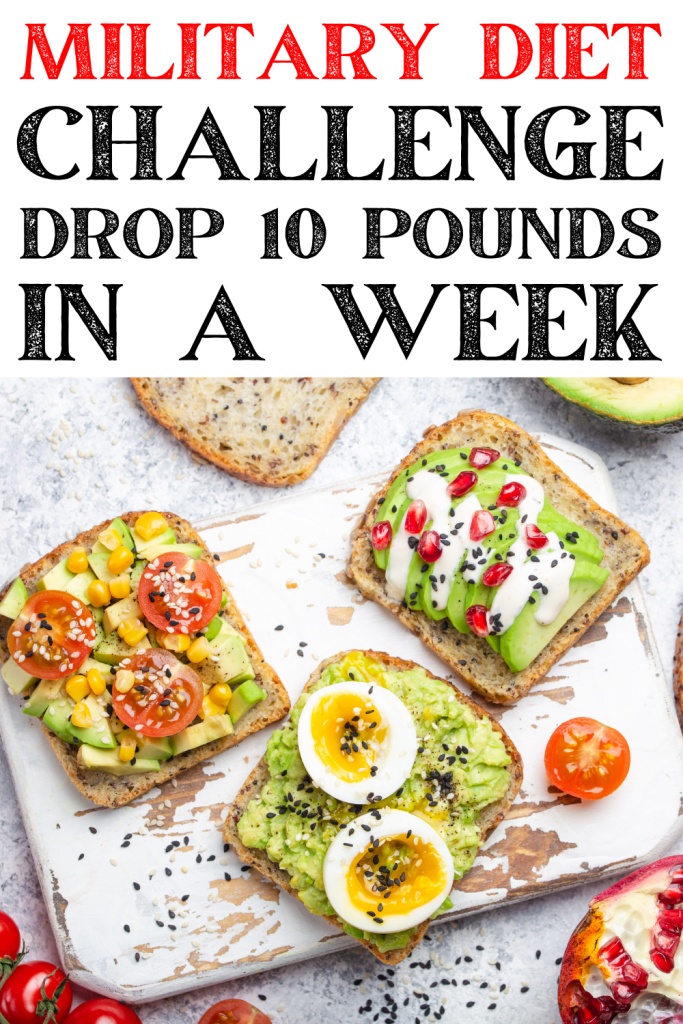Remember that time you desperately needed to fit into your favorite dress for a wedding, but the zipper wouldn't budge? Or that moment you saw a photo of yourself and wished you could magically erase those extra pounds? We've all been there, craving a quick fix for our weight loss woes. Enter the 3-Day Military Diet, a trending weight loss plan that promises to melt away those unwanted pounds in just a few days. But is it the miracle solution we've been waiting for, or just another fad diet destined for disappointment? Let's dive in and uncover the truth about this quick-fix diet.
What's the Buzz About the Military Diet?

The Military Diet, also known as the 3-Day Diet or Army Diet, is a low-calorie weight-loss plan that has taken the internet by storm. Its popularity stems from its promise of rapid weight loss, with some proponents claiming you could shed up to 10 pounds in a week. But how does it work, and is it truly effective?
The diet follows a two-phase structure:
- Phase 1: The first three days consist of a strict, low-calorie meal plan, typically ranging from 1,100 to 1,400 calories per day. This phase is designed to jumpstart weight loss by creating a calorie deficit.
- Phase 2: The following four days allow for a less restrictive diet, with a slightly higher calorie intake. This phase aims to help maintain the initial weight loss and prevent rebound weight gain.
The Military Diet's appeal lies in its simplicity and accessibility. It doesn't require any special foods or supplements, and the meal plans are readily available online. However, it's important to note that the diet is not affiliated with any military institution, despite its name.
One key factor contributing to its popularity is the rapid results it claims to deliver. Many people are drawn to quick fixes, especially when faced with upcoming events or tight deadlines. The Military Diet caters to this desire by promising significant weight loss within a short timeframe.
However, it's crucial to approach such claims with caution. While the diet may lead to initial weight loss due to its low-calorie nature, the sustainability and long-term effectiveness of this approach are questionable.
Before jumping on the bandwagon, it's essential to weigh the pros and cons, consult with a healthcare professional, and consider whether the Military Diet aligns with your individual health goals and lifestyle.
Fueling Your Body: The Military Diet Meal Plan

The Military Diet's meal plan is structured and specific, leaving little room for flexibility. The first three days are the most restrictive, with a set menu for breakfast, lunch, and dinner. Here's a glimpse of what you can expect:
Day 1:
- Breakfast: 1 slice of toast, 2 tablespoons of peanut butter maximum, 1 cup of black coffee or tea with caffeine, ½ grapefruit.
- Lunch: 1 slice of toast, up to ½ cup of white tuna fish, 1 cup of caffeinated coffee or tea.
- Dinner: 3 ounces of your preferred meat, 1 small apple, ½ banana, 1 cup green beans.
- Dessert: 1 cup vanilla ice cream.
Day 2:
- Breakfast: 1 slice of toast, 1 egg, ½ banana.
- Lunch: 5 saltine crackers, 1 egg (cooked to your preference), 1 cup cottage cheese.
- Dinner: 2 hot dogs (without buns), 1 cup broccoli, ½ cup carrots, ½ banana.
- Note: Dietitian Rothenberg points out that while Day 2 includes a cup of broccoli, a source of insoluble fiber, the quantity may not be sufficient.
Day 3:
- Breakfast: 5 saltine crackers, 1 apple, 1 slice of cheddar cheese.
- Lunch: 1 slice of toast, 1 egg.
- Dinner: ½ banana, 1 cup of tuna.
- Dessert: 1 cup vanilla ice cream.
Important Considerations:
- Portion Sizes: The Military Diet meal plan specifies strict portion sizes for each food item. Sticking to these portions is crucial to staying within the prescribed calorie limits.
- Snacking: Snacking is generally not allowed during the first three days. However, some variations of the diet may allow for small, low-calorie snacks between meals.
- Substitutions: The diet offers limited flexibility for substitutions. While you can choose your preferred lean meat or type of fish, most other food items are fixed.
- Hydration: Drinking plenty of water is essential throughout the diet, as it can help curb hunger and support overall health.
- Caffeine: Caffeine is encouraged in the form of black coffee or tea, as it can help boost metabolism and suppress appetite.
Following the Initial Three Days:
The remaining four days of the week allow for more flexibility in food choices, but calorie intake is still controlled. The goal is to gradually increase calorie intake while maintaining the weight loss achieved during the first phase.
While the Military Diet meal plan may seem simple, its restrictive nature can make it challenging to follow for some individuals. It's important to listen to your body's cues and prioritize your health and well-being above all else.
Pros: The Perks of a Quick Blitz

The Military Diet offers several appealing benefits that have contributed to its widespread popularity:
1. Rapid Weight Loss:
The most enticing aspect of the Military Diet is its potential for quick results. Due to its low-calorie intake, many individuals experience a noticeable drop in weight within the first three days. This can be particularly motivating for those seeking a fast solution for an upcoming event or a quick boost to their weight loss journey.
2. Simplicity and Convenience:
The Military Diet doesn't require any special ingredients, meal replacements, or expensive supplements. The meal plan is straightforward, and the food items are readily available at most grocery stores. This makes it easy to follow and eliminates the need for complex calculations or meal prepping.
3. Affordability:
Compared to other weight loss programs that often involve purchasing specialized products or joining costly memberships, the Military Diet is budget-friendly. It primarily relies on basic, inexpensive ingredients, making it accessible to a wide range of individuals.
4. Increased Motivation:
The initial weight loss experienced on the Military Diet can be a powerful motivator. Seeing the numbers on the scale go down quickly can instill a sense of accomplishment and encourage individuals to continue their weight loss efforts even after completing the diet.
5. Metabolic Boost:
Some proponents of the Military Diet claim that it can help boost metabolism due to its specific combination of foods and calorie restriction. However, scientific evidence to support this claim is limited, and more research is needed to determine the diet's long-term effects on metabolism.
While these benefits may seem alluring, it's important to remember that the Military Diet is not a magic solution. The rapid weight loss is often attributed to water weight and may not reflect a sustainable change in body composition. Furthermore, the diet's restrictive nature and lack of essential nutrients can pose potential risks and challenges.
Cons: Weighing the Trade-Offs

While the Military Diet may seem tempting due to its quick results and simplicity, it's important to consider the potential drawbacks before diving in:
- Unsustainable in the Long Run:
The Military Diet is not designed for long-term weight loss. Its restrictive nature makes it difficult to maintain over extended periods. Once you return to your regular eating habits, the weight you lost is likely to return. Sustainable weight loss requires a balanced approach that focuses on healthy eating and lifestyle changes.
- Nutritional Deficiencies:
The limited variety of foods in the Military Diet may lead to nutritional deficiencies. The diet lacks essential nutrients like fiber, healthy fats, and various vitamins and minerals. This can negatively impact your overall health and well-being.
- Potential Side Effects:
The drastic calorie reduction and restrictive nature of the diet can lead to several side effects, including fatigue, headaches, constipation, and irritability. In some cases, it may also trigger binge eating or unhealthy eating patterns.
- Muscle Loss:
The Military Diet's low-calorie intake and lack of protein can contribute to muscle loss. Muscles play a crucial role in metabolism, and losing muscle mass can slow down your metabolism, making it harder to maintain weight loss in the long run.
- Focus on Water Weight:
The initial weight loss experienced on the Military Diet is often attributed to water weight rather than fat loss. This is because the body's glycogen stores, which bind water, are depleted when calorie intake is significantly reduced. As soon as you resume a normal diet, the water weight will likely return.
- Lack of Scientific Evidence:
There is limited scientific evidence to support the long-term effectiveness and safety of the Military Diet. Most of the claims surrounding its benefits are anecdotal and lack scientific backing.
- Not Suitable for Everyone:
The Military Diet is not appropriate for everyone. Individuals with certain medical conditions, such as diabetes, eating disorders, or heart problems, should avoid this diet. Pregnant and breastfeeding women, as well as children and adolescents, should also steer clear of this restrictive eating plan.
Before starting the Military Diet or any other weight loss program, it's crucial to consult with a healthcare professional to discuss your individual health needs and goals. They can help you determine if this diet is a safe and appropriate option for you.
Is the Military Diet Your Perfect Match?

The Military Diet might be a good fit for you if:
- You need a quick fix: If you have a special event coming up and need to shed a few pounds quickly, the Military Diet may offer a temporary solution. However, it's important to remember that the weight loss is likely to be temporary and may not be sustainable in the long run.
- You're comfortable with a strict plan: The Military Diet requires strict adherence to a specific meal plan. If you thrive on structure and don't mind limited food choices, this diet might be manageable for you.
- You're not looking for a long-term solution: If you're seeking a quick weight loss boost rather than a sustainable lifestyle change, the Military Diet might be an option to consider. However, it's crucial to transition to a balanced and healthy eating plan afterward to maintain the results.
The Military Diet might not be the best choice if:
- You have any underlying health conditions: If you have any medical conditions like diabetes, heart disease, or eating disorders, it's essential to consult with your doctor before starting any new diet, including the Military Diet.
- You're pregnant or breastfeeding: Pregnant and breastfeeding women have different nutritional needs and should not follow restrictive diets like the Military Diet.
- You're sensitive to caffeine: The Military Diet encourages caffeine consumption, which can be problematic for individuals who are sensitive to its effects.
- You prefer flexibility and variety in your diet: The Military Diet is highly restrictive and doesn't allow for much flexibility or variety in food choices. If you enjoy experimenting with different foods and flavors, this diet might feel monotonous and unsustainable.
Ultimately, the decision of whether to try the Military Diet is a personal one. It's important to weigh the potential benefits and risks, consider your individual health needs and preferences, and consult with a healthcare professional before making a decision. Remember, there's no one-size-fits-all approach to weight loss, and what works for one person may not work for another.
Your Journey to a Healthier You: Beyond the Military Diet

While the Military Diet might offer a quick weight loss fix, it's not a sustainable or healthy long-term solution. If you're looking to achieve lasting results and improve your overall well-being, it's crucial to adopt a balanced and holistic approach to nutrition and fitness.
Here are some tips for a healthier journey:
- Prioritize Whole Foods: Focus on incorporating whole, unprocessed foods into your diet. These include fruits, vegetables, whole grains, lean proteins, and healthy fats. These foods provide essential nutrients, fiber, and energy to fuel your body andkeep you feeling satisfied.
- Practice Portion Control: Pay attention to portion sizes to avoid overeating. Use smaller plates and bowls, and listen to your body's hunger and fullness cues.
- Stay Hydrated: Drink plenty of water throughout the day to support your metabolism, digestion, and overall health.
- Move Your Body: Regular physical activity is crucial for weight management and overall well-being. Find activities you enjoy, whether it's dancing, swimming, hiking, or strength training, and aim for at least 150 minutes of moderate-intensity exercise per week.
- Seek Professional Guidance: Consider consulting a registered dietitian or nutritionist for personalized advice and guidance on creating a healthy eating plan that suits your individual needs and preferences.
- Be Patient and Kind to Yourself: Remember, sustainable weight loss takes time and effort. Don't get discouraged by setbacks, and focus on progress, not perfection. Celebrate your achievements and be kind to yourself throughout your journey.
Additional Tips for Long-Term Success:
- Keep a food journal: Tracking your food intake can help you identify patterns and make healthier choices.
- Plan your meals and snacks: This can help you avoid impulsive decisions and ensure you have nutritious options readily available.
- Get enough sleep: Adequate sleep is essential for weight management and overall health.
- Manage stress: Stress can trigger unhealthy eating habits. Find healthy ways to manage stress, such as exercise, meditation, or spending time in nature.
By adopting these healthy habits and making gradual changes, you can achieve sustainable weight loss, improve your overall health, and feel your best. Remember, the journey to a healthier you is a marathon, not a sprint.
So, there you have it – the 3-Day Military Diet laid bare. It's a tempting quick fix, a tempting detour on your weight loss journey. But remember, true health and lasting change don't come from crash diets. They come from nourishing your body, moving joyfully, and embracing a balanced lifestyle.
The Military Diet might be a temporary solution for a special occasion, but for long-lasting results, focus on building sustainable habits that will empower you to feel confident and vibrant every day. Your body deserves more than a quick fix – it deserves a lifelong commitment to health and happiness.
Ready to embark on a sustainable path to a healthier you? Let's ditch the fad diets and embrace a lifestyle that fuels your body, mind, and spirit. Remember, it's not about fitting into that dress; it's about feeling amazing in your own skin, every single day.
References
- The Effects of a Very Low-Calorie Diet on Weight Loss and Cardiometabolic Risk Factors in Obese Adults: A Randomized Controlled Trial.
- Long-Term Persistence of Hormonal Adaptations to Weight Loss.
- The Effect of Brief Periods of Energy Restriction on Weight Loss and Metabolic Outcomes: A Systematic Review and Meta-Analysis of Controlled Trials.
It's important to consult with a healthcare professional or registered dietitian before starting any new diet, especially one as restrictive as the Military Diet. They can help you assess your individual needs and determine if this diet is a safe and appropriate option for you.









14 Responses
I was skeptical at first, but the 3-Day Military Diet really surprised me! It’s amazing how much difference just three days can make. The meal plan is super easy to follow and the food is surprisingly good. I lost a few pounds and felt more energized by the end of it. If you’re looking for a quick and effective way to kickstart your weight loss, I highly recommend giving this a try!
Thank you for sharing your experience! We’re delighted to hear that the 3-Day Military Diet worked well for you and that you saw positive results. Our goal is to provide effective and easy-to-follow plans that deliver real results, so it’s great to know you found the meals enjoyable and energizing. Keep up the great work, and if you have any questions or need further assistance, feel free to reach out. We’re here to support you!
I’m really tempted to try this diet because I need to lose weight fast for my cousin’s wedding next month. But is it really safe to lose 10 pounds in a week? That sounds a bit extreme to me.
Hi Michelle, I understand the desire for quick results, especially with a big event coming up! While the Military Diet might result in rapid initial weight loss, it’s important to be cautious. Losing 10 pounds in a week is quite drastic, and much of that might be water weight. It’s generally recommended to aim for a more sustainable weight loss rate of 1-2 pounds per week. Also, such extreme restrictions can be hard on your body. I’d recommend focusing on making healthier choices overall, rather than relying on a crash diet. If you’re set on trying the Military Diet, please talk to your doctor first to make sure it’s safe for you, and consider it a very short-term solution, not a long-term plan.
This diet seems really restrictive. I’m worried about feeling hungry and tired all the time. Are there any snacks allowed on the Military Diet, or do you just have to suffer through the three days?
Hi Amanda, you’re right, the Military Diet is quite restrictive, and hunger can definitely be a challenge. Snacking isn’t typically allowed during the first three days, which is why it’s so important to drink plenty of water to help you feel full. Some variations of the diet might allow for a small, low-calorie snack, but it’s not part of the standard plan. If you’re concerned about managing hunger, this might not be the best diet for you. A more sustainable approach would involve incorporating healthy snacks between meals to keep your energy levels up and prevent extreme hunger.
This article is super informative! The Military Diet sounds pretty straightforward, but I’m a little worried about the lack of fruits and veggies. Don’t those play a big role in healthy weight loss? Also, three ounces of meat seems a bit small for someone who exercises regularly, like me. Will I be left feeling super hungry on this diet
Hi Sarah, thanks for your comment! You’re absolutely right, fruits and veggies are crucial for healthy weight loss. They provide essential vitamins, minerals, and fiber, which keep you feeling full and energized. The Military Diet’s limited variety might not offer the best balance in that regard.
As for portion sizes, it’s true that three ounces of meat might leave someone who exercises regularly feeling a little hungry. You could discuss adjusting the protein portions slightly with a healthcare professional or registered dietitian to ensure you’re getting enough nutrients to support your activity level.
Remember, the Military Diet is a short-term plan. It might be a good idea to follow it for the initial three days, then transition to a more balanced, sustainable approach that incorporates plenty of fruits, veggies, and whole grains alongside lean proteins. This way, you can lose weight in a healthy way and keep it off in the long run!
Okay, so ice cream is involved? You had me at ice cream! But seriously, this diet seems…odd. Hot dogs and ice cream? It feels like a pregnancy craving, not a weight loss plan! 😂 I’m also wondering, does this diet actually work, or is it just water weight I’ll lose and then gain back as soon as I look at a slice of pizza? Because I love pizza.
Hi Jessica, thanks for your comment! I know, the hot dogs and ice cream combo is a bit of a head-scratcher! It definitely doesn’t scream “health food,” does it? 😂 And you’re right to be skeptical about the weight loss. A significant portion of the initial weight loss on the Military Diet is likely due to water weight from the calorie restriction and carbohydrate reduction. So, yes, there’s a good chance you’ll regain some of that when you resume your regular eating habits (especially if “regular” involves pizza – which, let’s be honest, is amazing!).
The Military Diet can offer a quick jumpstart, but it’s not a sustainable long-term solution. It’s best to view it as a very short-term fix, not a permanent lifestyle change. If you’re looking for lasting weight loss, a balanced diet and regular exercise are still the best way to go. You can still enjoy pizza occasionally, just maybe not the whole pie in one sitting! 😉
Okay, I’m a little confused. This article says the Military Diet is super restrictive, but then it lists vanilla ice cream as a dessert?! That seems a little counterintuitive to me. How can you eat ice cream and still lose 10 pounds in a week? Is this diet just setting people up for failure by including “treats” that are going to make them crave more sugary foods? Also, does anyone know if there’s a vegetarian version of this? I’m skeptical…
Hey Melissa, you’ve hit on a common point of confusion with the Military Diet! The ice cream does seem a bit odd, right? The thinking is that a small, controlled portion of a “treat” might help people stick to the diet better, preventing them from feeling totally deprived and binging later. It’s also about creating a calorie deficit – even with the ice cream, the total calorie count for those days is still very low.
However, you’re right to question whether this sets people up for long-term success. Cravings are a real issue, and a little ice cream might not be enough to satisfy everyone. As for a vegetarian version, the main protein sources can be substituted. You could use tofu, lentils, or meat substitutes in place of the meat and fish. That said, you’d want to be very careful to ensure you are getting enough protein and the right balance of nutrients.
There are also vegetarian protein sources that can be used in place of cottage cheese, such as; silken tofu, Greek yogurt, or ricotta cheese. Instead of eggs you could have, Chia seed pudding, or a tofu scramble.
It’s always best to consult with a doctor or a nutritionist before starting a very restrictive diet like this, especially if you have specific dietary needs. They can help you make informed choices!
I tried this diet a few years ago before my sister’s wedding. I did lose some weight, but I felt absolutely terrible the whole time! I was tired, cranky, and constantly hungry. As soon as I went back to eating normally, the weight came right back. It felt like a total waste of time, and honestly, I think it messed up my relationship with food for a while. Has anyone else had this experience? I’m all for finding a sustainable way to lose weight, but this quick-fix stuff just doesn’t seem worth it. Is there any real evidence that this even works in the long run?
Sophia, thanks for sharing your experience. It’s a story that many can relate to, unfortunately. You’re absolutely right that the side effects of very low-calorie diets can be rough. Fatigue, irritability, and hunger are common complaints, and they make it really hard to stick to the plan, let alone feel good!
You’ve also nailed the biggest issue with the Military Diet: it’s just not sustainable. The weight that comes back on is often water weight and can be discouraging. The long-term effectiveness is also questionable as you have pointed out. There are some studies that suggest short-term calorie restriction can lead to weight loss, but they often don’t address the issue of weight maintenance afterward. There are links to scientific studies at the end of my article for you to look at if you wish.
The focus should really be on making gradual, sustainable lifestyle changes rather than resorting to crash diets. This includes eating a balanced diet of whole foods, exercising regularly, and getting enough sleep. It might take longer to see results, but it’s a much healthier and more effective approach in the long run. If anyone is seriously considering the Military Diet, please talk to a doctor or dietitian first. It’s essential to make sure it’s a safe and appropriate choice for you.